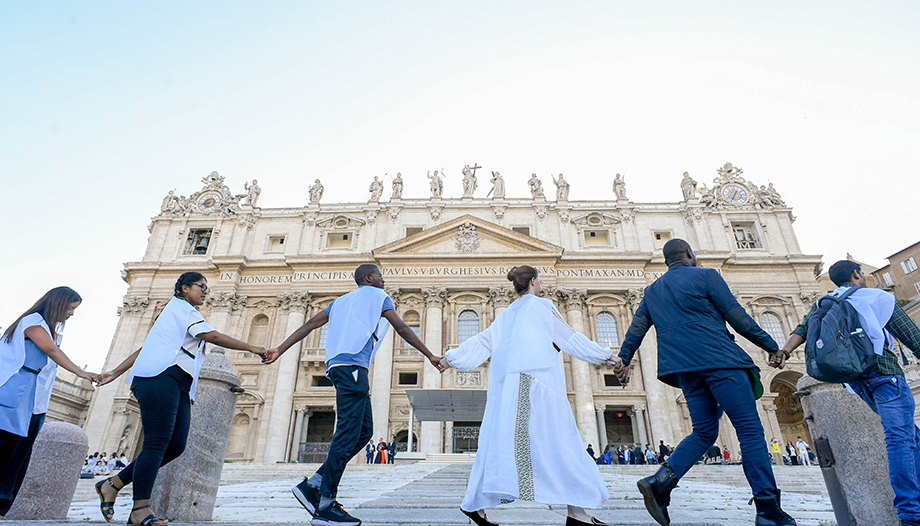"The Pope is fine, everything is going very well," confirmed Professor Sergio Alfieri, the surgeon who operated on the Pope last Wednesday. As director of the Department of Abdominal and Endocrine-Metabolic Medical-Surgical Sciences of the Gemelli Polyclinic, Alfieri explained that "the Holy Father has accepted the medical advice and tomorrow (Sunday) will pray the prayer of the Angelus in privateHe was spiritually united, with affection and gratitude, to the faithful who wish to accompany him, wherever they may be. We gave him a medical suggestion, and he decided".
The Holy Father spent the weekend "between rest and work" and "received the Eucharist," the Holy See Press Office reported. It was the eve of the celebration of the Solemnity of the Corpus Christi in some cities and countries, although in others, such as the Vatican, it was celebrated on Thursday. The Pope was recovering from the surgery he underwent on Thursday.
In an address to the thirty Nobel laureates, to world-renowned artists such as Andrea Bocelli, Al Bano, Amara or Roberto Bolle, and to the faithful who participated in the World Meeting on Human Fraternity, celebrated in St. Peter's Square, Pope Francis appealed: "Let us feel called to apply the balm of tenderness within relationships that have frayed, both between individuals and between peoples. Let us not tire of shouting 'no to war,' in the name of God or in the name of every man and every woman who aspires to peace."
"Inviolability of human dignity."
In a message to the Vatican event, entitled #NotAlone (not only), which was read by Cardinal Mauro Gambetti, Vicar of the Pope for Vatican City and President of the Fratelli tutti Foundation, the Pontiff began by saying that "although I am unable to receive you personally, I would like to welcome you and thank you from the bottom of my heart for your presence. I am happy to be able to reaffirm with you the desire for fraternity and peace for the life of the world".
The Pope went on to state: "In the Encyclical Fratelli tutti I wrote that 'fraternity has something positive to offer to freedom and equality' (n. 103), because whoever sees a brother sees in the other a face, not a number: he is always 'someone' who has a dignity and deserves respect, not 'something' to be used, exploited or discarded".
"In our world, torn apart by violence and war, tinkering and adjustments are not enough." added Francis, appealing, as reported above, that "only a great spiritual and social covenant born of hearts and revolving around fraternity can put the sacredness and inviolability of human dignity back at the center of relationships."
"For this reason, fraternity does not need theories, but concrete gestures and shared options that make it a culture of peace. The question we should ask ourselves is not what society or the world can give me, but what I can give to my brothers and sisters", he added.
"Returning home," the Pontiff specified, "let us think about what concrete gesture of fraternity we can make: reconciling with family, friends or neighbors, praying for those who have hurt us, recognizing and helping those who are in need, bringing a word of peace to school, university or social life, anointing with our closeness someone who feels alone."
By choosing fraternity, things change
The Pope also cited the parable of the Good Samaritan, a very common one in the Pontiff's messages. "I think of the parable of the Samaritan (cf. Lk 10:29-37), who stops with compassion before the Jew in need of help. Their cultures were enemies, their histories different, their religions hostile to one another, but for that man the person encountered on the road and his need were above all else".
Francis underlined: "When men and societies choose fraternity, policies also change: the person prevails again over profit; the common home that we all inhabit, over the environment that is exploited for one's own interests; work is paid a just wage; acceptance becomes wealth; life becomes hope; justice is opened to reparation and the memory of the evil caused heals in the encounter between the victims and the guilty".
At the end, Pope Francis wanted to embrace everyone, even if he was unable to do so physically yesterday: "From this afternoon that we have spent together I ask you to keep in your hearts and in your memories the desire to embrace the women and men of the whole world in order to build together a culture of peace. Peace, in fact, needs fraternity and fraternity needs encounter. May the embrace given and received today, symbolized in the square where you are gathered, become a commitment to life. And in prophecy of hope".
Cardinal Parolin: message of dialogue and peace
The Secretary of State of the Holy See, Cardinal Pietro Parolin, in his final message, referred to the dialogue and transparent negotiation: "United with Pope Francis, we wish to reaffirm that 'true reconciliation does not escape conflict but is achieved in conflict, overcoming it through dialogue and transparent, sincere and patient negotiation' (Fratelli tutti, n. 244). All this within the framework of the architecture of human rights".
"We want to cry out to the world in the name of fraternity," he continued: "Never ever war! It is peace, justice, equality that guides the destiny of all humanity. No to fear, to sexual and domestic violence! No more armed conflicts. No more nuclear weapons and landmines. No more forced migrations, ethnic cleansing, dictatorships, corruption and slavery. Let us stop the manipulative use of technology and artificial intelligence, let us put technological development before fraternity. We encourage countries to promote joint efforts to create societies of peace, such as the creation of a Ministry for Peace".







